(完整)PEP小学英语六年级上册重点句型及词汇
人教版PEP三起小学英语六年级上册知识点总结

人教版PEP三起小学英语六年级上册知识点总结Unit1 How can I get there?一、重点单词和短语Science科学museum博物馆post office邮局bookstore书店cinema电影院hospital医院tasty美味的,可口的London Eye伦敦眼stomach胃crossing十字路口turn left/turn right向左/右转go straight=walk straight直走next to紧挨着/与……相邻far from(离……远)near在……附近behind(在……后面)in front of(在……前面)between…and…(在…和…之间)二、重点句子1.How do you go to school? 你是怎样去上学的?2.where is the restaurant? 餐馆在哪里?3. Usually I go to school on foot. 我通常走路去上学。
4. Sometimes I go by bike. 有时候我骑自行车去。
5.问路之前,出于礼貌,我们要说“Excuse me”与后面的句子要用标点符号隔开。
6.Look at the traffic lights, remember the traffic rules. 看着交通灯,记住交通规则。
7.Stop at a red light.Wait at a yellow light. Go at a green light.红灯停。
黄灯等一等。
绿灯行。
8.Red means stop, yellow means wait, green means go. 红色的意思是停止,黄色的意思是等待,绿色的意思是通行。
9.How can I get to the park? 我该怎样到达公园呢?10.You can go by the No.15 bus. 你可以坐15路公交车去。
小学英语PEP六年级上册4-6单元知识点总结
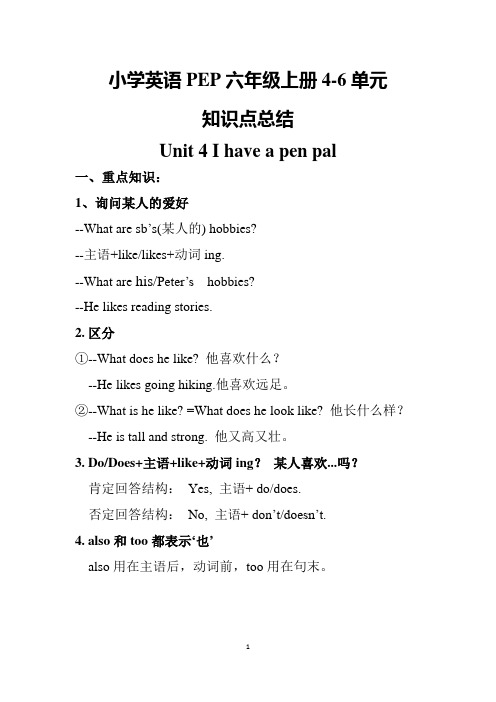
小学英语PEP六年级上册4-6单元知识点总结Unit 4 I have a pen pal一、重点知识:1、询问某人的爱好--What are sb’s(某人的) hobbies?--主语+like/likes+动词ing.--What are his/Peter’s hobbies?--He likes reading stories.2.区分①--What does he like? 他喜欢什么?--He likes going hiking.他喜欢远足。
②--What is he like? =What does he look like? 他长什么样?--He is tall and strong. 他又高又壮。
3.Do/Does+主语+like+动词ing?某人喜欢...吗?肯定回答结构:Yes, 主语+ do/does.否定回答结构:No, 主语+ don’t/doesn’t.4.also和too都表示‘也’also用在主语后,动词前,too用在句末。
5.宾语6.区别What is his hobby?(单数)What are his hobbies?(复数)7.be interested in对...感兴趣二、动词变三单:1、一般情况是在动词后加-s如:read - reads,write - writes,say – says2、以s,x,ch,sh,结尾的词加-es如:teach - teaches,wash - washes,3、①以辅音字母+y结尾的词变y为i再加-es如:try - tries②元音直接+s如:play -plays4、不规则变化如:have- has go-goes do-does三、动词ing变化规则:1、一般情况下,直接在动词后加-ing如:study ----- studying2、以不发音的e结尾,要去e加ing如:take - taking make -- making dance ---- dancing3、双写词尾字母,再加-ing如:run ----- runningswim----swimmingshop-shopping四、如何把肯定句变成一般疑问句1.如果有be动词和情态动词,直接把他们放在句首,I,we变成you2.句中没有be动词和情态动词,则根据主语借助do/does,后面的动词用原形(I,we变成you,主语是三单才用does 其他用do)补充:be动词包括am,is,are;情态动词:can,must,will,should五.如何变否定句1.句中有be动词或情态动词直接在其后加not2.句中无be动词或情态动词,根据主语用don’t或doesn’t 放在主语后,且后面的动词用原形。
新版PEP小学英语六年级上册1-6单元知识点总结
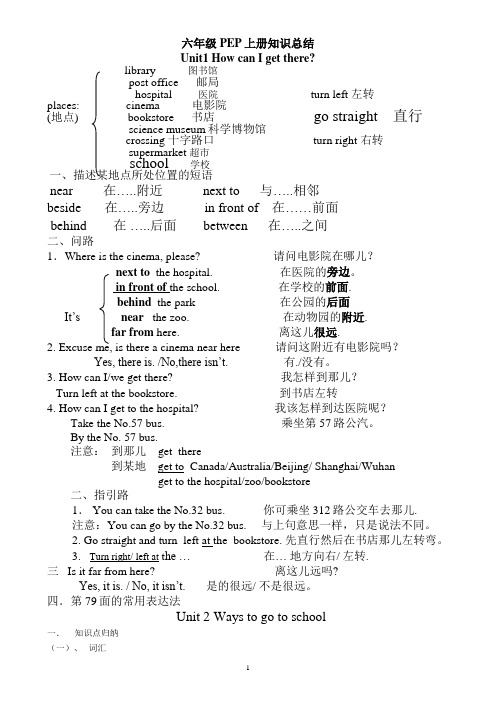
六年级PEP上册知识总结Unit1 How can I get there?library 图书馆post office 邮局hospital 医院turn left 左转places: cinema 电影院(地点) bookstore 书店go straight 直行science museum科学博物馆crossing 十字路口 turn right 右转supermarket 超市school 学校一、描述某地点所处位置的短语near 在…..附近 next to 与…..相邻beside 在…..旁边 in front of 在……前面behind 在…..后面 between 在…..之间二、问路1.Where is the cinema, please? 请问电影院在哪儿?next to the hospital. 在医院的旁边。
in front of the school. 在学校的前面.behind the park 在公园的后面It’s near the zoo. 在动物园的附近.far from here. 离这儿很远.2. Excuse me, is there a cinema near here 请问这附近有电影院吗?Yes, there is. /No,there isn’t. 有./没有。
3. How can I/we get there? 我怎样到那儿?Turn left at the bookstore. 到书店左转4. How can I get to the hospital? 我该怎样到达医院呢?Take the No.57 bus. 乘坐第57路公汽。
By the No. 57 bus.注意:到那儿 get there到某地 get to Canada/Australia/Beijing/ Shanghai/Wuhanget to the hospital/zoo/bookstore二、指引路1. You can take the No.32 bus. 你可乘坐312路公交车去那儿.注意:You can go by the No.32 bus. 与上句意思一样,只是说法不同。
(PEP)小学六年级英语上册知识汇总
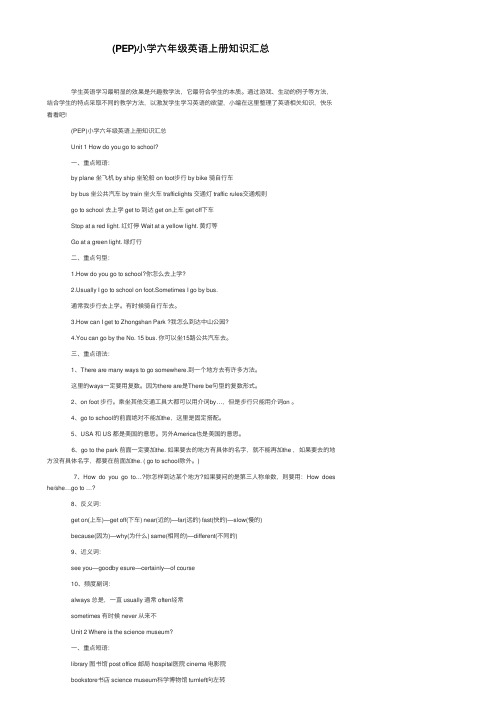
(PEP)⼩学六年级英语上册知识汇总 学⽣英语学习最明显的效果是兴趣教学法,它最符合学⽣的本质。
通过游戏、⽣动的例⼦等⽅法,结合学⽣的特点采取不同的教学⽅法,以激发学⽣学习英语的欲望,⼩编在这⾥整理了英语相关知识,快乐看看吧! (PEP)⼩学六年级英语上册知识汇总 Unit 1 How do you go to school? ⼀、重点短语: by plane 坐飞机 by ship 坐轮船 on foot步⾏ by bike 骑⾃⾏车 by bus 坐公共汽车 by train 坐⽕车 trafficlights 交通灯 traffic rules交通规则 go to school 去上学 get to 到达 get on上车 get off下车 Stop at a red light. 红灯停 Wait at a yellow light. 黄灯等 Go at a green light. 绿灯⾏ ⼆、重点句型: 1.How do you go to school?你怎么去上学? ually I go to school on foot.Sometimes I go by bus. 通常我步⾏去上学。
有时候骑⾃⾏车去。
3.How can I get to Zhongshan Park ?我怎么到达中⼭公园? 4.You can go by the No. 15 bus. 你可以坐15路公共汽车去。
三、重点语法: 1、There are many ways to go somewhere.到⼀个地⽅去有许多⽅法。
这⾥的ways⼀定要⽤复数。
因为there are是There be句型的复数形式。
2、on foot 步⾏。
乘坐其他交通⼯具⼤都可以⽤介词by…,但是步⾏只能⽤介词on 。
4、go to school的前⾯绝对不能加the,这⾥是固定搭配。
5、USA 和 US 都是美国的意思。
人教版PEP小学英语六年级上册重点句型及语法知识汇总

人教版PEP小学英语六年级上册重点句型及语法知识汇总Unit 1 How can I get there?重点单词XXX。
post office邮局,XXX。
XXX。
XXX。
crossing十字路口。
turn left左转。
turn right右转。
gostraight直走。
map地图。
compass指南针。
GPS全球定位系统。
stars星星。
XXX意大利餐厅。
getto到达。
重点句型1.---Where is the restaurant?餐厅在哪里?It’s next to the park on Dong fang Street.它在东方路,在公园附近。
2.---How can we get there?我们怎么去哪里?XXX left XXX.书店左转,然后病院右转。
3.He now has GPS.他现在有GPS。
4.What an interesting film!何等风趣的片子!方位词复:XXX紧挨着,near在。
邻近,XXX在。
背面,XXX在。
旁边,in front of在。
前面。
Unit 2 Ways to go to school重点单词on foot走路。
by bike骑车。
by bus乘公交。
by train乘火车。
XXX乘地铁。
by ship搭船。
by XXX乘飞机。
slow down 慢下来。
XXX交通灯。
traffic rules交通划定规矩。
go/come to school上学。
by sled坐雪橇。
byferry坐轮渡。
pay n to留意。
traffic lights交通灯。
and wait at a red light红灯停等一等。
slow downand。
at a yellow light黄灯减速并停下。
Go XXX。
重点句型1.---How do you come to school?你怎么上学?----Usually。
I come on foot.通常我走路来的。
(完整版)人教版(PEP)小学英语六年级上册复习资料
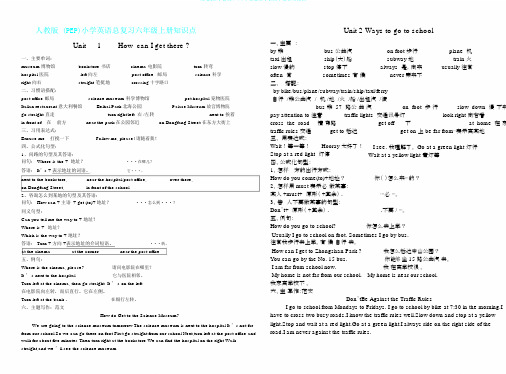
人教版 (PEP)小学英语总复习六年级上册知识点Unit1How can I get there ?一、主要单词:museum 博物馆bookstore 书店cinema 电影院turn 转弯hospital 医院left 向左post office邮局science 科学right 向右straight 笔挺地crossing 十字路口二、习惯语搭配:post office 邮局science museum 科学博物馆pet hospital 宠物医院Italian restaurant 意大利餐馆Beihai Park 北海公园Palace Museum 故宫博物院go straight 直走turn right/left 右 /左转next to 挨着in front of... 在 ...前方near the park 在公园邻近on Dongfang Street 在东方大街上三、习用表达式:Unit 2 Ways to go to school一、主要:by 乘bus 公共汽on foot 步行plane 机taxi 出租ship(大)船subway 地train 火slow 慢的stop 停下always 是,向来usually 往常often 常sometimes 有候never 素来不二、搭配:by bike/bus/plane/subway/train/ship/taxi/ferry自行 /乘公共汽 / 机 /地 /火 /船 /出租汽 /渡bus 乘 57 路公共汽on foot 步行slow down 慢下来pay attention to 注意traffic lights 交通讯号灯look right 向右看cross the road横穿路get off下at home 在家traffic rules 交通get to 抵达get on 上be far from⋯表示离某地Excuse me打搅一下Follow me, please! 请随着我!四、公式化句型:1、问路的句型及其答语:问句: Where is the + 地址?···在哪儿?答语: It’s + 表示地址的词语。
人教版(PEP)小学英语六年级上册各单元知识点归纳(三年级起点)
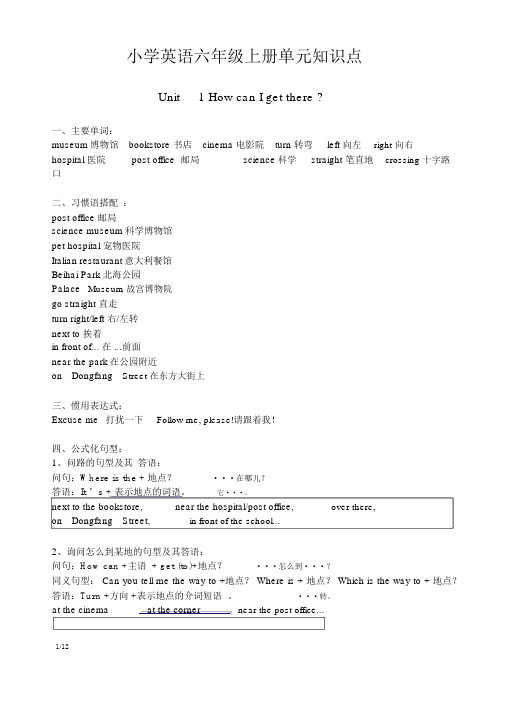
小学英语六年级上册单元知识点Unit 1 How can I get there ?一、主要单词:museum博物馆bookstore 书店cinema 电影院turn 转弯left 向左right 向右hospital 医院post office 邮局science科学straight 笔直地crossing 十字路口二、习惯语搭配:post office 邮局science museum科学博物馆pet hospital 宠物医院Italian restaurant意大利餐馆Beihai Park 北海公园Palace Museum 故宫博物院go straight 直走turn right/left 右/左转next to 挨着in front of... 在 ...前面near the park在公园附近on Dongfang Street 在东方大街上三、惯用表达式:Excuse me打扰一下Follow me, please!请跟着我!四、公式化句型:1、问路的句型及其答语:问句:Where is the + 地点?···在哪儿?答语:It ’s + 表示地点的词语。
它···。
next to the bookstore,near the hospital/post office,over there,on Dongfang Street,in front of the school...2、询问怎么到某地的句型及其答语:问句:How can +主语 + get (to)+地点?···怎么到···?同义句型: Can you tell me the way to +地点? Where is + 地点? Which is the way to + 地点?答语:Turn +方向 +表示地点的介词短语。
新PEP小学英语六年级上册复习资料
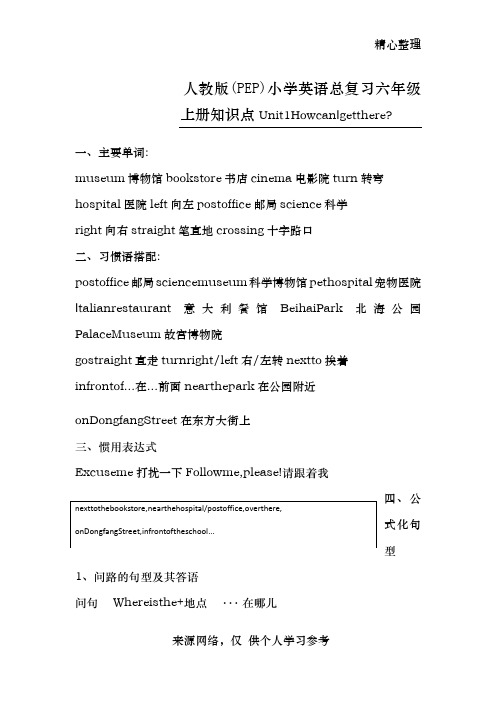
精心整理人教版(PEP)小学英语总复习六年级上册知识点Unit1Howcan I getthere? 一、主要单词:museum 博物馆bookstore 书店cinema 电影院turn 转弯:sciencemuseum talianrestaurantExcuseme 打扰一下 1Whereisthe+nexttothebookstore,nearthehospital/postoffice,overthere,I t’s+表示地点的词语。
它···。
2Howcan+主语+get(to)+the+Canyoutellmethewayto+Whereis+Whichisthewayto+Turn+方向+表示地点的介词短语。
atthecinemaatthecornernearthepostoffice...Whereisthecinema,please?I t’snexttothehospital.它与医院相邻。
Turnleftatthecinema,thengostraight.I t’sontheleft.在电影院向1、Whereisthemuseumshop?博物馆商店在哪里?I t’snearthedoor.他在门附近。
2、Whereisthepostoffice?邮局在哪里?I t’snexttothemuseum.它与博物馆相邻。
3、Whereistherestaurant?餐馆在哪里?I t’snexttothetheparkonDongfangStreet.它与东方街上的公园相邻。
Unit2Waystogotoschoolby乘bus公共汽车onfoot步行plane飞机taxi出租车ship subway地铁train火车slow慢的stop停下always usually通常often经常sometimes有时候never从来不,永不Wait Hooray I see.绿灯行Stopataredlight红灯停Waitatayellowlight1Howdoyoucome(to)+2、如何用must某人+must++.···必须···。
- 1、下载文档前请自行甄别文档内容的完整性,平台不提供额外的编辑、内容补充、找答案等附加服务。
- 2、"仅部分预览"的文档,不可在线预览部分如存在完整性等问题,可反馈申请退款(可完整预览的文档不适用该条件!)。
- 3、如文档侵犯您的权益,请联系客服反馈,我们会尽快为您处理(人工客服工作时间:9:00-18:30)。
PEP小学英语六年级上册重点句型及词汇PEP六年级上册四会单词Unit 1:by (经……,乘……) foot(脚) bike(自行车) bus(公共汽车) train(火车) how(怎样) go to school(上学)traffic(交通) traffic light(交通灯) traffic rule(交通规则)stop(停;停车站)wait(等;等待) get to(到达) by plane(乘飞机) by ship(乘轮船) by subway(乘地铁)Unit 2:library(图书馆) post office(邮局) hospital(医院) cinema(电影院) bookstore (书店)turn(转弯) then(然后) where(在哪里,到哪里) please(请) next to(与……相邻) turn right (向右转) turn left(向左转) gostraight(直走)north(北) south(南) east(东) west(西)Unit 3:next week(下周) this morning(今天上午) this afternoon(今天下午) this evening (今天晚上) comic book(漫画书) post card(明信片) newspaper(报纸) buy(购买)Unit 4:hobby(爱好) ride a bike—riding a bike(骑自行车) play the violin—playing the violin(拉小提琴) dive—diving(跳水) make kites—making kites(制作风筝) collect stamps—collecting stamps(集邮) live—lives(居住) teach—teaches(教) go—goes(去) watch—watches(看) read—reads(读,看) does(助动词,无义) doesn’t=does notUnit 5:singer(歌唱家,歌手) writer(作家) actor(男演员) actress(女演员) artist(画家)TV reporter(电视台记者) engineer(工程师) accountant(会计) salesperson(销售员)policeman(男警察) cleaner(清洁工) where(在哪里;到哪里) work(工作)Unit 6:rain(雨;下雨) cloud (云;云彩) sun(太阳) stream((小)河;(小)溪) come from(来自……;从……来) seed(种子) soil(土壤) sprout (苗;芽;嫩芽) plant(植物;种植) should (应该) then(然后)PEP六年级上册三会单词a pair of(一双)always(总是;一直)dictionary(词典;字典)magazine(杂志) tomorrow(明天)excuse me(对不起)fun(快乐;乐趣) go to the cinema (去看电影) look(看上去)month(月份;月)read a magazine(阅读杂志)science museum(科学博物馆)shoe store(鞋店)show(展览;演出;表演;节目) take (乘坐) take a trip(去旅行)tell(告诉)tonight(今晚)vapour(蒸汽;水汽)want (想要)with(同……;和……)know(知道)minute(分钟)again(再一次;又;再)PEP六年级上册四会句型Unit 1How do you go to school, Sarah? 萨拉,你怎样去上学?Usually I go to school on foot. 通常我步行去上学。
Sometimes I go by bike.有时候,我骑自行车去。
How can I get to Zhongshan Park?我怎样能到达中山公园?You can go by the No.15 bus.你可以乘15路公交车去。
Unit 2Where is the cinema, please? It’s next to the hospital.请问,电影院在哪里?它与医院相邻。
Turn left at the cinema, then go straight. It’s on the left.在电影院处向左转,然后直行。
它在左边。
Unit 3What are you going to do on the weekend?周末你打算干什么?I’m going to visit my grandparents this weekend.这个周末我打算拜访我的祖父母。
Where are you going this afternoon? I’m going to the bookstore.今天下午你打算去哪里?我打算去书店。
What are you going to buy?你打算买什么?I am going to buy a comic book.我打算买一本漫画书。
Unit 4What’s your hobby?你的爱好是什么?I like collecting stamps.我喜欢集邮。
He likes collecting stamps, too.他也喜欢集邮。
Does she teach English? No, she doesn’t.她教英语吗?不,她不教。
Does she teach you math? Yes, she does.她教你数学吗?是的,她教数学。
Unit 5What does your mother do?你的妈妈是干什么的? She is a TV reporter.她是一位电视工作者。
Where does she work?她在哪里上班? She works in a school.她在一所学校上班。
How does she go to work?她怎样去上班?She goes to work by bus.她坐公交车去上班。
Unit 6Where does the rain come from? It comes from the clouds.雨来自哪里?它来自于云朵。
How do you do that?你怎样做那件事呢?What should you do then?接下来,你应该做什么呢?PEP六年级上册三会句型1. My home is near.我的家很近。
2.What about you?你呢?3.Look at the traffic lights.看交通灯。
4.Remember the traffic rules.记住交通规则。
5.Stop at a red light.红灯停。
6.Wait at a yellow light.黄灯等。
7.Go at a green light.绿灯行。
8.Can I go on foot? Sure, if you like. It’s not far.我能步行去嘛?当然,如果你喜欢。
它不远。
9.Where is the …? It’s near the …10.Excuse me, is there a … near here? Yes, there is.打扰一下,在这附近有没有一家…?是的,有。
11.Is it far from here? No, it’s not far.它离这儿远吗?不,它不远。
12.–Thank you. –You’re welcome.谢谢,不客气。
13.Where is the …? …在哪里?It’s east/west/south/north of the …它在…的东边,西边,南边,北边。
14.When are you going? I am going at 3 o’clock.你打算什么时候去?我打算3点钟去。
15.Can he go with us? Sure.他能和我们一起去嘛?当然。
16.Let’s go together.让我们一起去吧。
17.There is a stamp show on Sunday.在星期天,有一个邮票展。
18.She is a teacher. She teaches math.她是一位老师,她教数学。
19.Does your pen pal live in Shanghai?你的笔友住在上海吗?No, he doesn’t. He lives in Beiji ng.不,他不住上海。
他住在北京。
20.Where does she work? She works in a car company.她在哪里上班?她在一家汽车公司上班。
21.How does she go to work? She goes to work by bus.她怎样去上班呢?她坐公交车去上班。
22.Where does the … come from? It comes from the ……来自于哪里?它来自于…23.How can the water become vapour?水如何能变成蒸汽呢?The sun shines and the water becomes vapour.在太阳的照射下,水就变成了蒸汽。
24.How do you do that?你怎样做那件事呢?First, put the seeds in the soil.首先,把种子放进土壤里。
25.It’s easy.它很简单。
26.What should you do then?接下来你应该做什么呢?Water them. In several days, you can see a sprout.给它们浇水,几天后,你就能看见一株幼苗。
27.First, …Then, …Next, …At last, …首先,然后,接下来,最后,语法复习一、现在进行时态(3种变化规律)1.直接加ing:do—doing draw—drawing cook—cooking answer—answering read—reading listen—listening fly—flying sing—singing play—playing2.去掉末尾的e加ing:write—writing dance—dancing take—takinghave—having make—making ride—riding dive—diving3.双写末尾字母加ing: get—getting runrunning swim—swimming sit—sittingput—putting你正在干什么?What are you doing? I’m answering the phone.他/她/它正在干什么?What is he/she/it doing? He’s/She’s/It’s …他(她、它)们正在干什么?What are they doing? They are …看到like或likes后面的动词要加上ing二、一般将来时态(be going to/will +动词原形)表示一般将来时的时间状语有:this morning, this afternoon, this evening, tomorrow, tonight, this weekend, on the weekend, next week, next month, next year, next weekend.(今晚)你将要做什么?What are you going to do (this evening)?I’m going to the cinema.I’m going to visit my grandparents.你将什么时候去?When are you going?I’m going at 7:10.你将怎样去呢? How are you going?I’m going by bus.今天下午你将要去哪里?Where are you going this afternoon?I’m going to the bookstore.你将要买什么呢?What are you going to buy?I’m going to buy a comic book.你将和谁一起去?Who are you going with?I’m going with my parent s.三、第三人称单数后面的动词要加s或es1.一般情况加s,如:read—reads;live—lives;play—plays;sing—sings2.动词末尾以s,x,ch,sh或部分以o结尾的加es。
